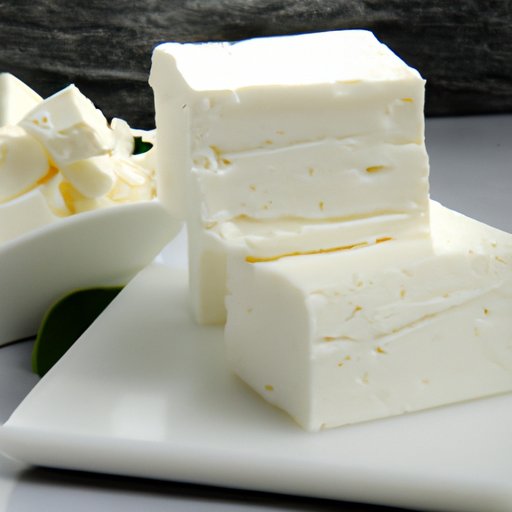Introduction
Feta cheese is a creamy white cheese that originated in Greece. It’s made from sheep’s milk or goat’s milk, or a combination of both, and is known for its salty flavor. Feta is a popular ingredient in Greek cuisine, and it is used to make salads, sandwiches, pizza toppings, and more. But is feta cheese actually healthy? This article will explore the nutritional benefits and health risks of eating feta cheese.

Nutritional Benefits of Feta Cheese
Feta cheese is an excellent source of protein, providing about 5.6 grams per ounce. It’s also rich in calcium, with 36% of your daily value in one ounce. Feta also contains several other vitamins and minerals, such as phosphorus, magnesium, zinc, and vitamin B12. In terms of calories, one ounce of feta has 73 calories and 6 grams of fat.
How Feta Compares to Other Types of Cheese
When compared to other types of cheese, feta is relatively low in fat and calories. For example, one ounce of cheddar cheese has 115 calories and 9 grams of fat, while one ounce of mozzarella has 85 calories and 6 grams of fat. In terms of taste and texture, feta is much crumblier than other cheeses and has a distinctively salty flavor.

Exploring the Health Risks of Eating Feta
Although feta cheese is a nutritious food, there are some potential health risks associated with eating it. First, feta can contain allergens, such as lactose and casein, which can cause adverse reactions in people who are sensitive to these proteins. Additionally, feta is high in sodium, with about 370 milligrams per ounce. Eating too much sodium can increase blood pressure levels and lead to other health problems.
Ways to Incorporate Feta into Healthy Meal Plans
If you want to enjoy the flavor and nutrition of feta cheese without overdoing it on the salt content, there are plenty of ways to incorporate it into a healthy diet. Salads are a great way to add feta cheese, as the crumbly texture complements other ingredients like tomatoes, cucumbers, and olives. You can also use feta cheese as a topping for sandwiches or pizza for extra flavor. Just be sure to watch your portion sizes, as feta is still high in calories and fat.
The Pros and Cons of Eating Feta
Overall, feta cheese can be a healthy addition to your diet, but it’s important to consider the pros and cons before you start eating it regularly. On the plus side, feta is a good source of protein, calcium, and other vitamins and minerals. Plus, it adds flavor and texture to dishes. On the downside, it is high in sodium and may contain allergens. It’s also relatively high in calories, so it should be consumed in moderation.

Examining the Impact of Feta on Blood Pressure Levels
One of the main concerns with eating feta cheese is its high sodium content. Studies have shown that excessive sodium intake can increase blood pressure levels, which can lead to other health issues. However, feta cheese is also a good source of potassium, which helps to reduce blood pressure levels. According to a study published in the American Journal of Hypertension, “Potassium intake from dairy foods, including feta cheese, is associated with lower systolic and diastolic blood pressure levels.”
Conclusion
In conclusion, feta cheese is a nutritious food that can be enjoyed in moderation as part of a balanced diet. It’s a good source of protein, calcium, and other vitamins and minerals, and it adds flavor and texture to dishes. However, it is high in sodium and may contain allergens, so it should be eaten in moderation. Additionally, studies have shown that eating feta cheese can help to lower blood pressure levels due to its high potassium content.
(Note: Is this article not meeting your expectations? Do you have knowledge or insights to share? Unlock new opportunities and expand your reach by joining our authors team. Click Registration to join us and share your expertise with our readers.)
